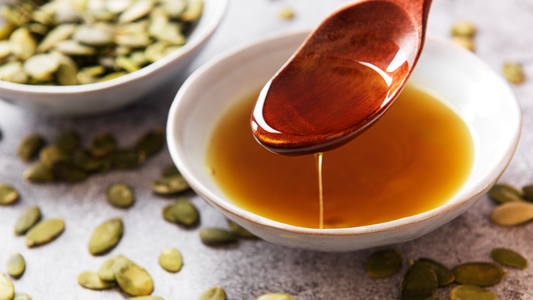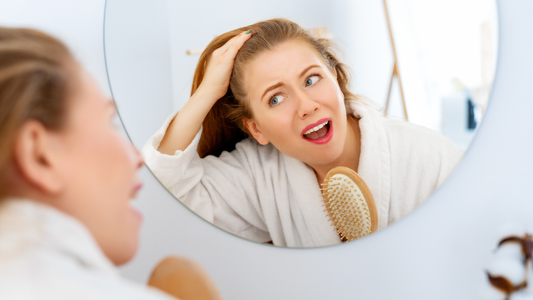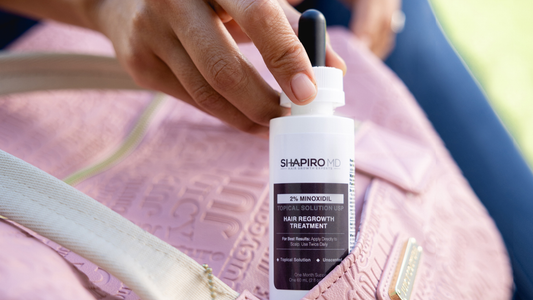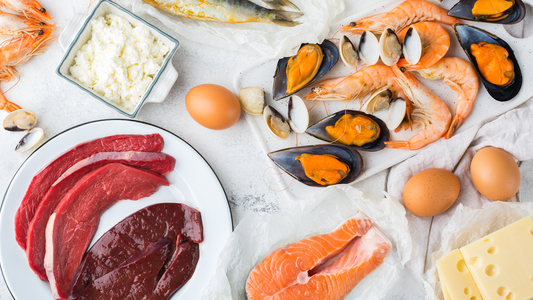Show me someone who’s never experienced a bad hair day, and I’ll say, “Nice to meet you, Jennifer Aniston.” Virtually everyone struggles with their hair. We’ve all endured the occasional day, week, or junior year of college where we’d rather make like Bret Michaels and wear a bandana 24/7.
Ultimately, the secret to a good hair day is strong, nourished strands. You can’t get soft, shiny style and ample staying power without a healthy foundation. More products and supplements than ever before tout biotin as the secret weapon for heartier hair, but is it effective? Read on to discover the basics on biotin and whether it lives up to the hype.
What Is Biotin?
Biotin is a member of the vitamin B family. It’s water-soluble and performs a handful of roles in your body, the most prominent of which is turning what you eat into energy.
If you’re like most people, though, you've heard of biotin because of the role it may play in keeping your skin, nails and hair strong. Despite being part of the B-vitamin clan, biotin was initially referred to as vitamin H — the letter “H” standing for “Haar und Haut,” which is German for "hair and skin."
How Does Biotin Help Your Hair, Nails and Skin?
Research into exactly how biotin helps your hair, nails and skin stay healthy is new and ongoing, but preliminary studies suggest that it stimulates the production of keratin, the protein from which your hair, nails and skin are made.
Keratin's Effect on Hair
Keratin is a protective protein. When your hair absorbs keratin, for example, it has a smoothing effect, causing the overlapping cells that make up individual hairs to lie neatly. The end result is fuller, shinier-looking strands that are less frizzy and more manageable. Biotin also offers promising results regarding pediatric hair loss. In the end, stronger hair is less likely to fall out, no matter how old you are.
Effect on Nails and Skin
Very early studies show that biotin may also help strengthen brittle fingernails and toenails, improving thickness and durability. In a small group of cases, biotin had a positive effect on infant skin rashes as well.
Can You Be Biotin Deficient?
You can, but it’s uncommon, particularly in the United States. Biotinidase deficiency is a rare genetic condition where the body can’t make use of the biotin found in foods. For most individuals, symptoms first appear during childhood and may include:
- Hair loss (head and body)
- Skin rashes and infections, particularly around the eyes nose, mouth and anus
- Muscle weakness
- Elevated acidity of blood and urine
- Brittle nails
- Conjunctivitis (a.k.a. pink eye)
Infants who are biotin-deficient may also appear sluggish and develop more slowly in general.
In more severe cases, biotin deficiency can cause vision and hearing loss, problems with movement and balance, breathing issues and seizures. Physicians typically treat reduced biotin levels with biotin supplements.
Women who are pregnant or breastfeeding may also become biotin deficient. Most expectant mothers get all the biotin that they and their babies need by taking a prenatal vitamin that includes biotin.
What Types of Biotin Supplements Are There?
Biotin is available without a prescription in a variety of formulations, including gummies, powders and liquids. The most common way that people take biotin supplements is via tablet or capsule.
Biotin is found in multivitamins, B-complex vitamins, and standalone, biotin-only supplements. These capsules are typically gluten-free as well as free from the most common allergens. Aside from dosage size and any dietary concerns (such as needing a vegan capsule), the main thing to look for in a supplement is third-party quality testing.
What Are Other Benefits of Taking a Biotin Supplement?
Research on biotin’s benefits is still in its early stages, but studies suggest that biotin may provide an array of other benefits:
- Improving multiple sclerosis symptoms
- Treating hyperlipidemia
- Treating hypoglycemia
- Helping type-2 diabetics regulate their blood glucose
- Preventing kidney damage in type-1 diabetics
How Much Biotin Should I Take?
Biotin needs vary by age. The NIH Office of Dietary Supplements makes the following recommendations:
| Age | Recommended Daily Amount of Biotin |
| 0-6 months | 5 micrograms |
| 7-12 months | 6 micrograms |
| 1-3 years | 8 micrograms |
| 4-8 years | 12 micrograms |
| 9-13 years | 20 micrograms |
| 14-18 years | 25 micrograms |
| 19 and older | 30 micrograms |
Additionally, the NIH recommends that pregnant women take 30 micrograms daily, while moms who are breastfeeding opt for 35 micrograms every day. It’s important that expectant mothers don’t take too much biotin, as it can be harmful to the baby.
Are There Any Side Effects of Taking a Biotin Supplement?
There are no negative side effects to taking a biotin supplement if you don’t overdo it. Because it’s water-soluble — which means your body doesn’t store it — it’s difficult to overdose on biotin. Once you stop, whatever remains in your system will be eliminated naturally.
That said, if your levels do get too high, it may throw off tests that involve measuring your hormone levels. Too much biotin can yield a false positive for thyroid diseases, for example.
Will Taking a Biotin Supplement Affect Any Other Medications or Supplements?
In general, biotin plays well with others. That said, you should still talk with your doctor before beginning any type of supplement or medication. He or she can go over your list of prescriptions and existing supplements to look for potential problem areas. Your doctor can also make sure you’re not taking any drugs or supplements that are negatively affecting how your body processes biotin. Certain antiseizure drugs, for instance, can reduce biotin in both concentration and effectiveness when taken for an extended period.
Do Any Foods Contain Biotin?
In addition to supplements, you can also boost your biotin intake by eating a variety of biotin-rich foods, such as:
- Bananas
- Cauliflower
- Mushrooms
- Whole grains
- A variety of nuts and nut butters
- Egg yolks
- Soybeans
Heat and other cooking processes can zap biotin’s efficacy, so the less processed the food, the better. Dip raw cauliflower in your favorite hummus instead of roasting it, for example. While you're at it, complement this biotin-rich grub with plenty of avocados and other foods that are high in vitamin E, which is also great for hair health. The same goes for foods that contain plenty of omega-3 and omega-6 fatty acids, such as walnuts, chia seeds and several types of fish.
Science still has a lot to learn about biotin, but the studies conducted thus far are compelling, and biotin is a key nutrient for great hair.
Time is of the essence when it comes to breakage and hair loss. If you’re concerned about brittle or thinning hair, it may be time to connect with a professional. Shapiro MD’s trained clinicians are here for that. It’s easier than ever to get a custom treatment plan, all from home – click here to start your free online consultation.
Sources
https://www.ncbi.nlm.nih.gov/pmc/articles/PMC4989391/
https://rarediseases.org/rare-diseases/biotinidase-deficiency/
https://www.tandfonline.com/doi/abs/10.1517/17425255.2016.1136288




